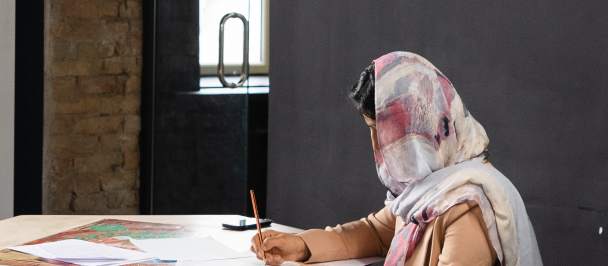Agriculture as a tool for making a change: the story of Shahrzad from Afghanistan
February 10, 2025

Shahrzad stands in front of Kazakh National Agrarian Research University.
Shahrzad dreams of becoming a plant scientist. In 2021, she went abroad to study and work toward making the world a better place. Today, she is a third-year student at the Kazakh National Agrarian Research University, hoping her knowledge and skills will help turn her aspirations into reality. Her goals for the future? Strengthening agricultural sustainability, improving food production, and creating opportunities for others to build better lives.
Shahrzad is one of the participants in the second phase of UNDP’s regional initiative to empower Afghan women through education and training in Central Asia, funded by the European Union (EU). The pilot initiative enabled 50 Afghan women to study in Kazakhstan and Uzbekistan. Thanks to additional EU funding in 2021, students also gained the opportunity to study in Kyrgyzstan. By 2027, over 100 Afghan women will have earned academic and professional degrees from universities across Central Asia.
Explaining her motivation for pursuing an agricultural degree, Shahrzad highlights that nearly 80 percent of Afghanistan’s economic activity is linked to farming and livestock.
“I’ve always been fascinated by how essential plants are to our lives—we wouldn’t survive without them. They provide the food we eat and the medicine we rely on. Studying plant science allows me to work with nature and find ways to help people—whether by improving agricultural practices, increasing food accessibility, or exploring the potential of medicinal herbs. What inspires me most is how small changes, like the right lighting or soil conditions, can lead to significant results,”she says.

Shahrzad is conducting a practical exercise.
According to Shahrzad, Afghanistan’s agricultural sector holds vast potential for empowering women. Many Afghan communities already have women with deep knowledge of plants and traditional medicine. With access to resources and markets, they could turn this expertise into successful careers. When women succeed, communities grow stronger.
“I believe it’s crucial to create safe spaces where women can study and work, as well as provide them with credit or grants that will enable them to become full participants in society and the industry,”Shahrzad emphasizes.

Shahrzad is conducting a practical exercise.
In Afghanistan today, barriers such as limited access to education, land, and financial support prevent many women from realizing their potential. A recent UNDP study on Afghan women entrepreneurs highlights that in a country where 15.8 million people face food insecurity, and the employment rate for working-age women in households plummeted to just 6 percent in 2023, entrepreneurship has become a lifeline for women and their families. The study reveals that 80 percent of women-led businesses rely on their income as their primary source of livelihood. These businesses also create much-needed employment opportunities for other women.
Reflecting on her academic achievements, Shahrzad proudly shares details of her business plan to produce herbal medicinal tea:
“I realized how valuable traditional knowledge is and how little people know about it. With the right approach, this knowledge can be transformed into something beneficial for both public health and the economy.”

Shahrzad is conducting a practical exercise.
For Shahrzad, giving up on dreams is never an option. She believes in learning, asking questions, and striving for new horizons—not just for herself but for the greater good:
“I want to develop ideas that make agriculture and food production simpler and more sustainable, especially in Afghanistan, where outdated farming methods severely limit the country’s potential. Through business and technology, I hope to create opportunities for people to build better lives through agriculture and position Afghanistan as a recognized exporter of agricultural products.”

 Locations
Locations



